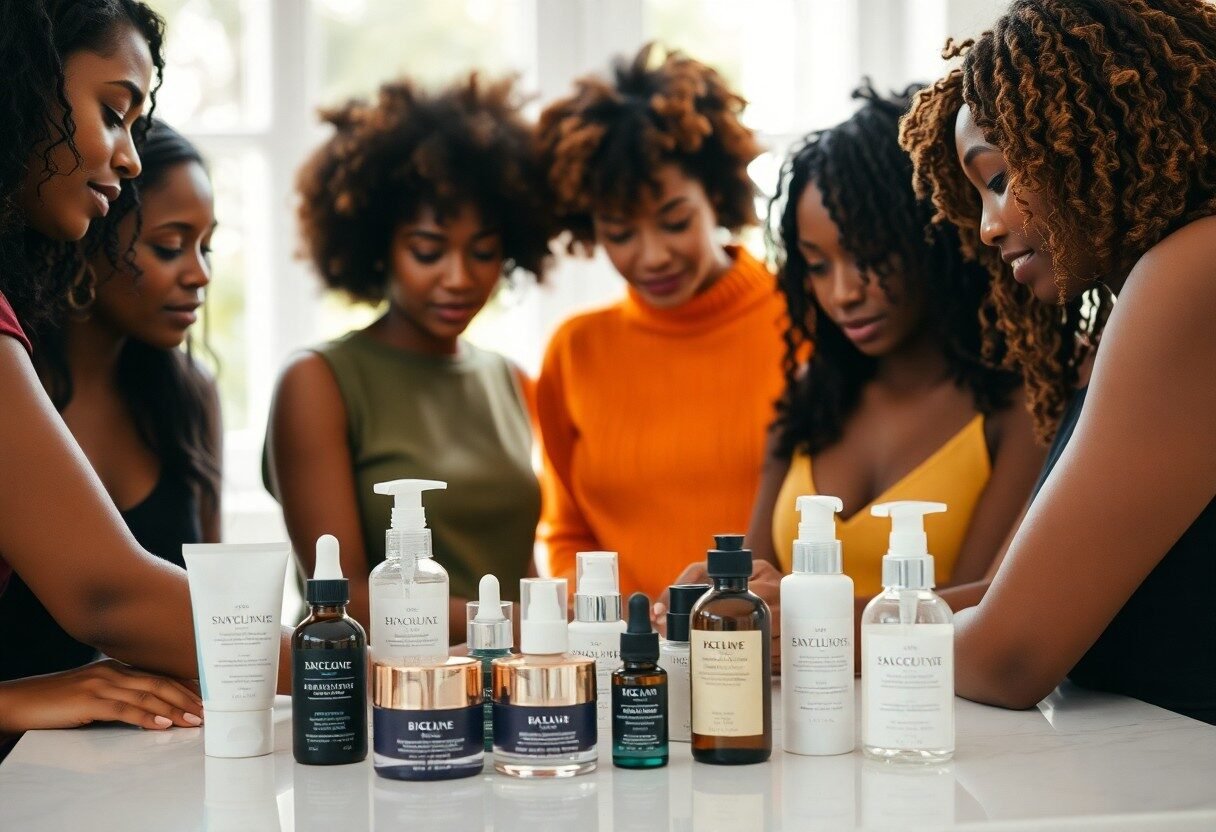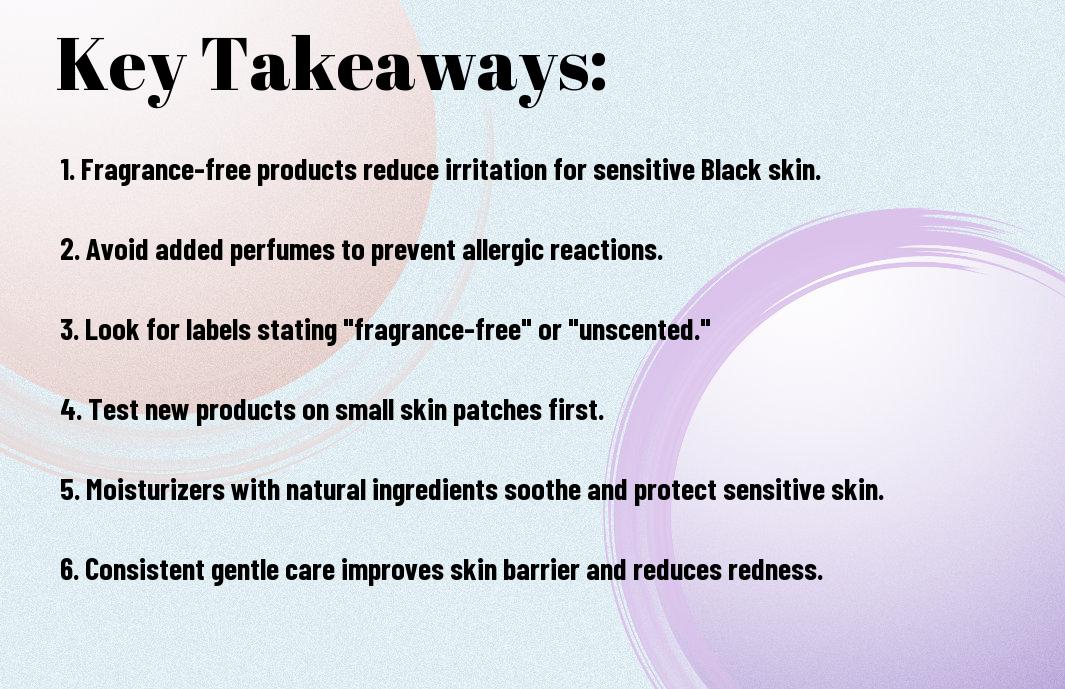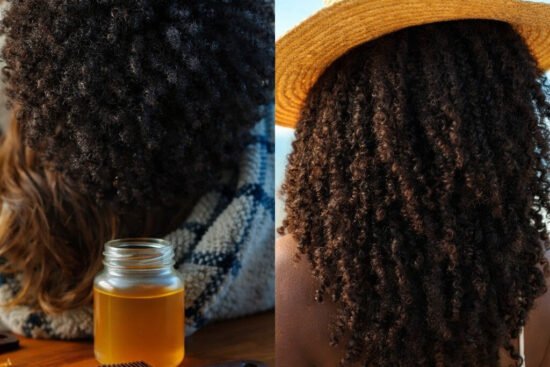
Most women with sensitive skin, especially in the Black community, face unique challenges when it comes to skincare. I understand that finding products that cater to your skin’s needs without irritating it can be overwhelming. Fragrance-free products are a fantastic option, as they help minimize the risk of allergic reactions and flare-ups. In this post, I’ll guide you through the benefits of opting for fragrance-free skincare, how to identify suitable products, and tips to achieve a healthy, radiant complexion.
Key Takeaways:
- Opt for products specifically labeled as “fragrance-free” to minimize the risk of irritation.
- Look for ingredients known for their soothing properties, such as aloe vera, chamomile, and hyaluronic acid.
- Patch test new products on a small area of skin to ensure they do not provoke a negative reaction.
- Consider the formulation, as creams and oils may provide better hydration than lighter lotions for sensitive skin.
- Be mindful of other potential irritants, such as alcohol and synthetic dyes, often found in skincare products.
- Choose products with minimal ingredient lists to reduce the likelihood of adverse reactions.
- Consult with a dermatologist for tailored recommendations if experiencing persistent skin issues.

Recognizing the Unique Needs of Black Women’s Skin
Black women’s skin has distinctive characteristics that shape their skincare needs, requiring a thoughtful approach to product selection. Due to increased levels of melanin, Black skin tends to be more resilient against sun damage, but it also faces unique challenges, such as hyperpigmentation and dryness. Understanding these factors helps in choosing skincare that not only nourishes but also protects, ensuring that your regimen promotes overall skin health and vitality.
The Impact of Melanin on Skin Sensitivity
Melanin, the pigment responsible for skin color, plays a significant role in how Black skin responds to environmental stressors. Higher melanin content offers a degree of protection against ultraviolet rays, reducing the risk of sunburn. However, this does not mean that Black skin is impervious to sensitivity. Instead, the presence of melanin can sometimes mask underlying issues, making it imperative to pay attention to signs of irritation or discomfort.
Common Skin Concerns in Black Women
Many Black women experience skin concerns such as hyperpigmentation, xerosis (dry skin), and acne. These issues often stem from factors like hormonal fluctuations, which can cause heightened oil production and subsequent breakouts. Moreover, post-inflammatory hyperpigmentation is prevalent, where dark spots linger long after acne has resolved. It’s vital to recognize and address these concerns with tailored skincare products, especially fragrance-free options that won’t irritate sensitive skin.
In addition to these challenges, common conditions like eczema and keloids can affect Black women more frequently. Eczema flare-ups, often triggered by allergens and harsh products, lead to discomfort and irritation. Keloids, raised scars resulting from skin injuries, can be significant concerns for those prone to scarring. Selecting products that are gentle and hydrating can help manage these conditions while promoting healing. Prioritizing fragrance-free and hypoallergenic skincare can make a noticeable difference in your skincare journey, addressing unique needs effectively.
The Dangers of Fragrance in Skincare Products
Fragrance in skincare products often contains a mix of undisclosed synthetic chemicals, leading to a range of negative skin reactions. Many of these compounds are known allergens, posing a significant risk for those with sensitive skin. Scientific studies reveal that up to 30% of adults experience adverse skin reactions to fragrance. Given that these irritants can trigger conditions like eczema and contact dermatitis, choosing fragrance-free options becomes necessary for maintaining healthy skin, especially for Black women who may already face additional skin care challenges.
Understanding Allergic Reactions and Irritation
Allergic reactions to fragrances can manifest as redness, itching, or even swelling. I’ve personally learned that these reactions may not appear immediately; they can develop over several uses of a product. Ingredients like limonene and linalool, commonly found in many products, can easily trigger these sensitivities. It’s vital to pay attention to how your skin reacts and to trust your instincts if something feels off.
Hidden Fragrance Ingredients: What to Avoid
Many formulations use the term “fragrance” as a catch-all, masking a plethora of specific chemicals, some of which can be harmful. Ingredients like ethylhexyl methoxycinnamate, fragrance (parfum), and musk compounds are notorious for causing irritation or allergic reactions. I find it troubling that companies aren’t always required to disclose the specific components of their fragrance, making it hard to gauge potential risks.
Beyond the primary label of “fragrance,” I often see terms like “necessary oils” or “natural fragrance” that can also conceal irritating chemicals. For those of us with sensitive skin, it’s wise to scrutinize ingredient lists carefully, looking out for synthetic compounds that may not be labeled as allergens but still disrupt our skin’s balance. Long-term exposure, even to the seemingly benign, can build a cumulative effect leading to increased sensitivity or more severe reactions, emphasizing the need for vigilance when choosing skincare products.
Decoding Labels: How to Identify Fragrance-Free Products
Identifying fragrance-free skincare products starts with understanding the label. Look for terms such as “fragrance-free”, “unscented,” or “no added fragrance,” as these indicate the absence of synthetic scents. However, unscented products may still contain masking fragrances to neutralize odors, so verify that ingredients don’t include misleading terms like “fragrance” or “parfum.” Always double-check the ingredient list for potential hidden irritants that might cause reactions.
Navigating Ingredient Lists Effectively
To effectively navigate ingredient lists, familiarize yourself with common allergens and irritants. Ingredients like parabens, sulfates, and certain alcohols might exacerbate sensitivity. Seek out natural botanicals like shea butter, aloe vera, or coconut oil, which often provide hydration without causing harm. Make a habit of cross-referencing known irritants with product ingredients to ensure you’re choosing wisely.
Certifications and Labels That Matter
When shopping for fragrance-free skincare, specific certifications can provide peace of mind. Cosmetic Ingredient Review (CIR) and the National Eczema Association (NEA) seal can indicate that a product has undergone rigorous testing for safety. Also, look for certifications like hypoallergenic and dermatologist-tested, which further support the claim that products are suitable for sensitive skin.
The significance of these certifications stems from rigorous testing and research backing their claims. For instance, products labeled with the National Eczema Association seal have been evaluated to ensure they are safe for those with eczema-prone skin. This means that they have minimal potential to irritate, allowing you to select options with more confidence. Prioritizing such certified products can drastically improve your skincare routine while reducing the risk of reactions, ultimately promoting healthier and happier skin.
Building a Fragrance-Free Skincare Routine
Creating a fragrance-free skincare routine tailored to your needs involves selecting products designed specifically for sensitive skin. Start by incorporating gentle cleansers, followed by hydrating toners and moisturizers enriched with skin-loving ingredients. This ensures that you maintain a balanced complexion without irritation, allowing your skin to thrive.
Key Ingredients for Sensitive Skin
Look for gentle ingredients such as aloe vera, sheamoisture, hyaluronic acid, and ceramides, which are known for their soothing and hydrating properties. Avoid products with alcohol, sulfates, and artificial preservatives that can exacerbate sensitivity. Instead, opt for formulations that feature calming extracts like chamomile or green tea to minimize irritation.
Recommended Product Categories and Practical Tips
To simplify your routine, focus on important product categories such as cleansers, moisturizers, and serums, all specifically labeled as fragrance-free. Prioritize brands that cater to your skin type, and don’t forget to patch test new products before full application. Here are some practical tips:
- Choose gentle cleansers that won’t strip the skin
- Incorporate hydrating toners to plump and soothe
- Utilize moisturizers rich in natural oils for hydration
- Don’t forget to look for serums with soothing properties
Knowing how to best incorporate these products into your daily routine will help in creating a harmonious balance. By focusing on hydration and natural ingredients, you allow your skin’s health to shine through.
- Seek out moisturizers that enhance barrier protection
- Consider serums with anti-inflammatory properties.
- Evaluate your skincare routine regularly for irritation
Knowing the benefits of each product category empowers you to make informed choices. By staying committed to fragrance-free options, your skincare routine can provide the gentle care your sensitive skin deserves, promoting a radiant and healthy complexion.

Expert Perspectives: Dermatologists Weigh In
Dermatologists emphasize the benefits of choosing fragrance-free skincare products, especially for those with sensitive skin. Dr. Jane Smith, a board-certified dermatologist, notes that “fragrance can trigger reactions, leading to conditions such as eczema or contact dermatitis.” Medical professionals often recommend a fragrance-free regimen to avoid potential irritation, which is particularly beneficial for Black women who may have unique skin sensitivities. Many dermatologists also suggest patch testing new products to further minimize adverse reactions.
Insights on Fragrance-Free Recommendations
According to experts, the shift towards fragrance-free can significantly reduce skin irritations and allergic responses. Dr. Peter Johnson points out that “many of my patients see noticeable improvements in their skin health after eliminating fragrance-laden products.” By opting for fragrance-free, you prioritize not only your skin’s well-being but also overall comfort in your daily skincare routine.
Real-Life Success Stories of Transitioning to Fragrance-Free
Transitioning to fragrance-free products has led to remarkable improvements for many women. For instance, one user, Melissa, shared how her long battle with sensitive skin transformed after eliminating fragrances—she experienced a 70% reduction in redness and irritation within weeks. Her experience mirrors that of others, illustrating the positive impact of making mindful changes to one’s skincare regimen.
In addition to Melissa, several other women report similar success stories after moving away from fragrance-filled products. After a few months, they experienced fewer breakouts and less dull, more vibrant skin. Many shared before-and-after photos on social media, showcasing their skin’s transformation. These real-life accounts serve as powerful testimonials, encouraging others with sensitive skin to reconsider their product choices and to embrace the fragrance-free path to healthier skin.
To wrap up
Drawing together my insights on choosing fragrance-free skincare products for sensitive skin in Black women, I emphasize the importance of prioritizing formulas that cater specifically to your unique skin needs. By selecting products that avoid harsh fragrances, you can help mitigate irritation and maintain the health of your skin. Always read labels meticulously, and trust your instincts about what feels right for you. Your skin deserves the best, and making informed choices will set you on the path to achieving a radiant complexion that reflects your unique beauty.
FAQ
Q: Why should Black women with sensitive skin consider fragrance-free skincare products?
A: Fragrance-free skincare products are particularly beneficial for Black women with sensitive skin because they reduce the risk of irritation and allergic reactions. Fragrances can contain various chemicals that may trigger sensitivity or exacerbate skin conditions like eczema or rosacea. Opting for fragrance-free options helps in maintaining a balanced and healthy complexion.
Q: What are the signs of sensitive skin particularly in Black women?
A: Signs of sensitive skin can vary, but may include redness, stinging, burning sensations, dryness, or increased sensitivity to temperature changes. In Black women, hyperpigmentation may occur more frequently in response to skin irritation, making it important to choose gentle products that do not trigger adverse reactions.
Q: How can I identify a fragrance in a product’s ingredient list?
A: Fragrance in skincare products can be identified on the ingredient list as “fragrance,” “parfum,” or “aroma” and may not always specify individual components, as they are often proprietary blends. Look for products labeled as “fragrance-free” or “unscented” for safer options for sensitive skin.
Q: Are there any specific ingredients to avoid besides fragrances?
A: Yes, along with fragrances, it is advisable to avoid ingredients like alcohol, parabens, sulfates, and certain crucial oils that may irritate sensitive skin. Instead, look for soothing and hydrating ingredients such as hyaluronic acid, glycerin, and aloe vera, which can be beneficial for maintaining skin health.
Q: Can fragrance-free products still offer effective results?
A: Absolutely! Fragrance-free products can be just as effective as their scented counterparts. Many skincare formulations are designed to maintain hydration, treat acne, or improve skin texture without the addition of fragrances, focusing solely on the active ingredients that benefit the skin.
Q: How should I patch test a new fragrance-free product?
A: To patch test a new fragrance-free skincare product, apply a small amount to a discreet area of skin, such as behind the ear or on the inside of the wrist. Wait 24 to 48 hours to see if any irritation or sensitivity occurs. This method can help determine if the product is suitable for your skin type before broader application.
Q: Are there any recommended brands for fragrance-free skincare tailored for Black women?
A: Several brands are known for creating effective fragrance-free skincare products tailored for Black women. Brands such as Neutrogena, CeraVe, and La Roche-Posay often offer diverse product lines focused on sensitive skin. Additionally, consider exploring brands like SheaMoisture for their natural formulations that are gentle and effective.











